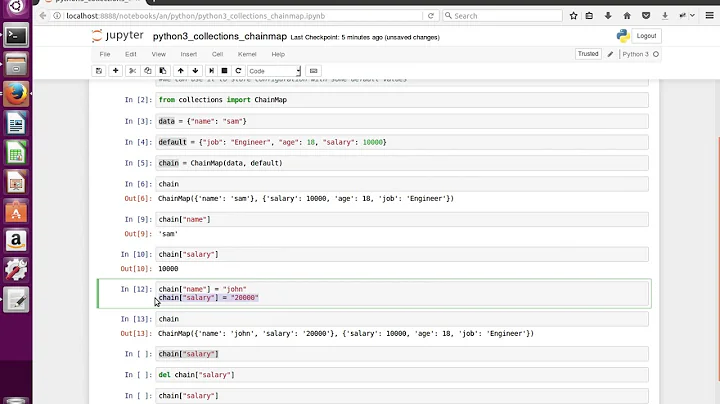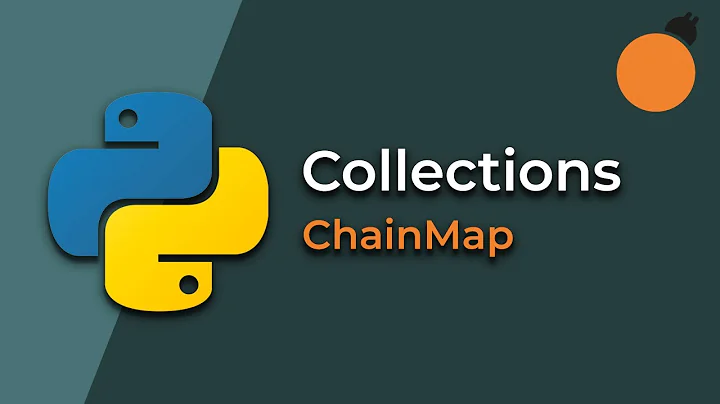What is the purpose of collections.ChainMap?
Solution 1
I like @b4hand's examples, and indeed I have used in the past ChainMap-like structures (but not ChainMap itself) for the two purposes he mentions: multi-layered configuration overrides, and variable stack/scope emulation.
I'd like to point out two other motivations/advantages/differences of ChainMap, compared to using a dict-update loop, thus only storing the "final" version":
More information: since a ChainMap structure is "layered", it supports answering question like: Am I getting the "default" value, or an overridden one? What is the original ("default") value? At what level did the value get overridden (borrowing @b4hand's config example: user-config or command-line-overrides)? Using a simple dict, the information needed for answering these questions is already lost.
Speed tradeoff: suppose you have
Nlayers and at mostMkeys in each, constructing a ChainMap takesO(N)and each lookupO(N)worst-case[*], while construction of a dict using an update-loop takesO(NM)and each lookupO(1). This means that if you construct often and only perform a few lookups each time, or ifMis big, ChainMap's lazy-construction approach works in your favor.
[*] The analysis in (2) assumes dict-access is O(1), when in fact it is O(1) on average, and O(M) worst case. See more details here.
Solution 2
I could see using ChainMap for a configuration object where you have multiple scopes of configuration like command line options, a user configuration file, and a system configuration file. Since lookups are ordered by the order in the constructor argument, you can override settings at lower scopes. I've not personally used or seen ChainMap used, but that's not surprising since it is a fairly recent addition to the standard library.
It might also be useful for emulating stack frames where you push and pop variable bindings if you were trying to implement a lexical scope yourself.
The standard library docs for ChainMap give several examples and links to similar implementations in third-party libraries. Specifically, it names Django’s Context class and Enthought's MultiContext class.
Solution 3
I'll take a crack at this:
Chainmap looks like a very just-so kind of abstraction. It's a good solution for a very specialized kind of problem. I propose this use case.
If you have:
- multiple mappings (e.g, dicts)
- some duplication of keys in those mappings (same key can appear in multiple mappings, but not the case that all keys appear in all mappings)
- a consuming application which wishes to access the value of a key in the "highest priority" mapping where there is a total ordering over all the mappings for any given key (that is, mappings may have equal priority, but only if it is known that there are no duplications of key within those mappings) (In the Python application, packages can live in the same directory (same priority) but must have different names, so, by definition, the symbol names in that directory cannot be duplicates.)
- the consuming application does not need to change the value of a key
- while at the same time the mappings must maintain their independent identity and can be changed asynchronously by an external force
- and the mappings are big enough, expensive enough to access, or change often enough between application accesses, that the cost of computing the projection (3) each time your app needs it is a significant performance concern for your application...
Then, you might consider using a chainmap to create a view over the collection of mappings.
But this is all after-the-fact justification. The Python guys had a problem, came up with a good solution in the context of their code, then did some extra work to abstract their solution so we could use it if we choose. More power to them. But whether it's appropriate for your problem is up to you to decide.
Solution 4
To imperfectly answer your:
Bonus question: is there a way to use it on Python2.x?
from ConfigParser import _Chainmap as ChainMap
However keep in mind that this isn't a real ChainMap, it inherits from DictMixin and only defines:
__init__(self, *maps)
__getitem__(self, key)
keys(self)
# And from DictMixin:
__iter__(self)
has_key(self, key)
__contains__(self, key)
iteritems(self)
iterkeys(self)
itervalues(self)
values(self)
items(self)
clear(self)
setdefault(self, key, default=None)
pop(self, key, *args)
popitem(self)
update(self, other=None, **kwargs)
get(self, key, default=None)
__repr__(self)
__cmp__(self, other)
__len__(self)
Its implementation also doesn't seem particularly efficient.
Related videos on Youtube
alecxe
"I am a soldier, at war with entropy itself" I am a Software Developer and generalist who is in love with the Python language and community. I greatly value clean and maintainable code, great software, but I know when I need to be a perfectionist and when it stands in a way of product delivery. I like to break things, to find new ways to break things, to solve hard problems, to put things under test and stress, and to have my mind blown by an interesting question. Some of my interests: Learning, Productivity, AI, Space Exploration, Internet of Things. "If you change the way you look at things, the things you look at change." - Wayne Dyer If you are looking for a different way to say "Thank you": Amazon wish list Pragmatic wish list Today I left my phone at home And went down to the sea. The sand was soft, the ocean glass, But I was still just me. Then pelicans in threes and fours, Glided by like dinosaurs, An otter basked upon its back, And dived to find another snack. The sun corpuscular and bright, Cast down a piercing shaft, And conjured an inspiring sight On glinting, bobbing craft. Two mermaids rose up from the reef, Out of the breaking waves. Their siren song was opium grief, Their faces from the grave. The mermaids asked a princely kiss To free them from their spell. I said to try a poet’s bliss. They shrugged and bid farewell. The sun grew dark and sinister, In unscheduled eclipse. As two eight-headed aliens Descended in their ships. They said the World was nice enough But didn’t like our star. And asked the way to Betelgeuse, If it wouldn’t be too far. Two whales breached far out to sea, And flew up to the sky, The crowd was busy frolicking, And didn’t ask me why. Today I left my phone at home, On the worst day, you’ll agree. If only I had pictures, If only you could see. Not everything was really there, I’m happy to confess, But I still have the memories, Worth more than tweets and stress. Today I left my phone at home, I had no shakes or sorrow. If that is what my mind can do, It stays at home tomorrow. Gavin Miller
Updated on February 19, 2020Comments
-
 alecxe about 4 years
alecxe about 4 yearsIn Python 3.3 a
ChainMapclass was added to thecollectionsmodule:A ChainMap class is provided for quickly linking a number of mappings so they can be treated as a single unit. It is often much faster than creating a new dictionary and running multiple update() calls.
Example:
>>> from collections import ChainMap >>> x = {'a': 1, 'b': 2} >>> y = {'b': 10, 'c': 11} >>> z = ChainMap(y, x) >>> for k, v in z.items(): print(k, v) a 1 c 11 b 10It was motivated by this issue and made public by this one (no
PEPwas created).As far as I understand, it is an alternative to having an extra dictionary and maintaining it with
update()s.The questions are:
- What use cases does
ChainMapcover? - Are there any real world examples of
ChainMap? - Is it used in third-party libraries that switched to python3?
Bonus question: is there a way to use it on Python2.x?
I've heard about it in
Transforming Code into Beautiful, Idiomatic PythonPyCon talk by Raymond Hettinger and I'd like to add it to my toolkit, but I lack in understanding when should I use it.-
 alecxe about 10 yearsI'm also trying to fill the gap: there are questions about
alecxe about 10 yearsI'm also trying to fill the gap: there are questions aboutdefaultdict,namedtuple...but there is no aboutChainMap. So, for me, this is a way to contribute also. Thanks in advance. -
Marcin about 10 yearsAny time you need to update a mapping, and might want to reverse those updates is a perfect time.
-
Martijn Pieters about 10 yearsReal-world use-case: the GET and POST parameter mappings in a web framework, providing a combined view on two distinct and separate dictionaries.
-
 mhlester about 10 yearsAs for using it in 2.x, the source code looks like it could possibly Just Work, though I haven't tried
mhlester about 10 yearsAs for using it in 2.x, the source code looks like it could possibly Just Work, though I haven't tried -
Raymond Hettinger about 10 yearsFWIW, there is a precursor already in Python2.7:
from ConfigParser import _ChainMap as ChainMap. -
 alecxe about 10 years@RaymondHettinger thank you for the nice and useful comments and for the
alecxe about 10 years@RaymondHettinger thank you for the nice and useful comments and for theChainMapitself. You could have made a good answer out of the chain of comments :) -
Rob Dennis over 9 yearsif you want to import in 2.7 as Raymond suggests, it's actually
_Chainmap(note the capitalization of m) -
 alecxe over 9 years@RobDennis good catch, thank you!
alecxe over 9 years@RobDennis good catch, thank you!
- What use cases does
-
Marcin about 10 yearsChainmap is useful where all keys appear in all mappings, for example if you want to push and pop versions of the mapping.
-
BobHy about 10 yearsFair enough, though if all your dicts have all the same keys, you can probably just create a new single dict with updated values faster.
-
Marcin about 10 yearsYes it would be faster, but it wouldn't support pop/push functionality.
-
Raymond Hettinger about 10 years+1 This is a nice answer that covers the alternative implementations and links to the multiple examples of chained name spaces mentioned in the docs.
-
Raymond Hettinger about 10 years+1 This is a reasonable comparison. It would by nice to have some analogies to other technologies. For example, operating system command lines have a notion of a path which is essentially a chain of directory lookups until a match is found. In Python, that would be modeled with a ChainMap.




